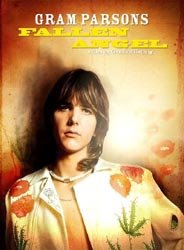Gram Parsons on film
 He was a pretty boy, a rich boy, a drug addict and an opportunist. And he happened to be an American musical icon. And as befits many American cult legends, it took the Europeans to give him the befitting props in a form of a BBC-sponsored documentary and a German director.
He was a pretty boy, a rich boy, a drug addict and an opportunist. And he happened to be an American musical icon. And as befits many American cult legends, it took the Europeans to give him the befitting props in a form of a BBC-sponsored documentary and a German director.2004's Fallen Angel takes a pretty straight-forward look at the life of Gram Parsons, weaving in interviews of family, friends and musicians who knew him, loved him and appreciated him but didn't kid themselves about his failings.
Chris Hillman (Byrds, Flying Burrito Brothers) fills in many details about Gram's tenure in both bands, including the real reason he left the Byrds (he wanted to hang out with Keith Richards) and how GP was fired from the Burritos. His drug intake assured that and ruined many shows which could have otherwise helped to promote his band and later his own solo career: even his tailor noted that his famous nudie suit (pictured above) told the story of his destruction, lined with pot, pills and naked women.
His rock star ambitions led him to the Stones but also kept him away from the Burritos. Hillman recounts how he had to go to a Stones session to drag back Parsons. Even Mick Jagger told GP that he should leave and work with his own band.
Parsons' family recounts the sad details of a father's suicide, a mother's descent into alcoholism and a step-father who at first embraced him and later pushed him away. Later, his sidekick recounts the details of how he stole Parsons' dead body from an airport to burn the remains in the middle of the desert as he thought GP would have wanted it: though he's still unrepentant about the deed, the family (including his wife) is still in tears when they remember it.
But beyond the usual Behind the Music melodramas (and this case, there's some startling ones), there's also an admirable amount of detail in the movie that makes a good case for GP's legendary musical status. Richards tells how much he had learned from Gram about country music and it's obvious that he also taught the Byrds a thing or two about the same, thus infusing two of the most popular, influential rock bands at the time (and still today, truth be told) with these ideas. Ultimate groupie/fan Pamela Des Barres provides some great details about how important GP's mission was: not only would he play his favorite country records for his friends and associates to make sure they understood and appreciated that music too but he also made the idea of country music palatable to a rock crowd. Not that he was the first to do (see Buck Owens, one of his heros) or the only one to do it but up until that time, few in the rock world had done it so thoroughly and passionately (I was intrigued by this myself, compiling a group of articles about him in 2001 for my zine when another spate of GP activity was happening).
But when all is said in done, there's no denying that his stature is also built on his 1973 demise. The old live-fast-die-young scenario (which similarly claimed Morrison, Joplin, Hendrix not long before that) plus his overdosing death not to mention the bizarre necrophilia coda all just add to the myth.
The fact that Fallen Angel is able to capture much of these facets of GP's life is impressive (though it's regrettable that one of his sisters and Roger McGuinn couldn't be included there). Which isn't to say that this is the final word on Gram. He's already the subject of a few biographies not to mention others that may materialize later. It's safe to say that the whole alt-country/No Depression movement would be pretty unthinkable without him. A country star who wooed the rock world or a rock star that wooed country music into its realm? One of GP's gifts was that he blurred all of that.

0 Comments:
Post a Comment
<< Home